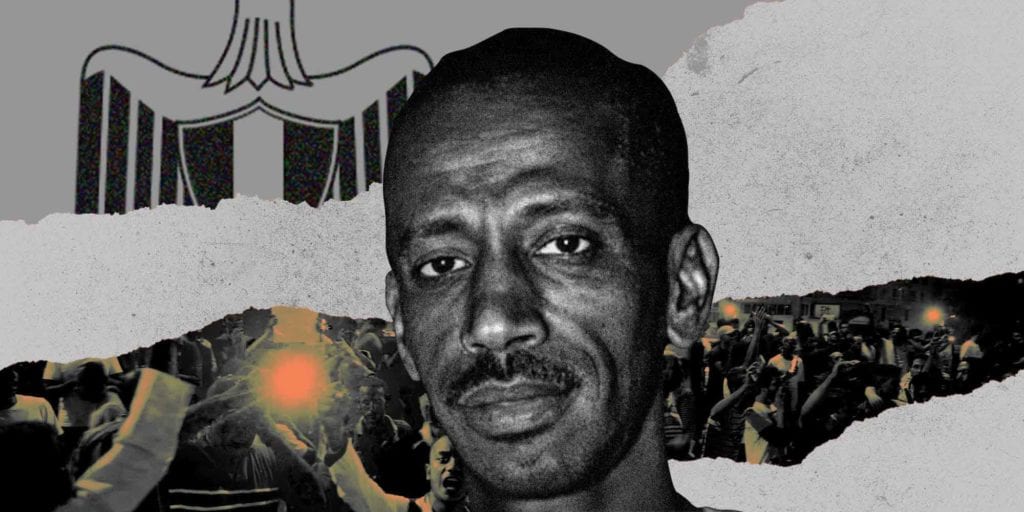Gerges Magdy is the only Christian among 540 players currently active in the Egyptian Premier League. He generally avoids speaking in public, as he fears for his position at his club ENPPI. The reason for his anxiety is that he may be asked about being the only Christian, the hidden world of the so called Church League, and the many Coptic youngsters who did entry exams at the major clubs, yet decided to retire from football before their career had even started.
Take Mina Essam. In 2016, he passed the exam at Al Ahly, beating 250 other children who wanted to join the club’s goalkeeping center. Club officials told Mina to go to the club’s branch in the Cairo suburb of Nasr City for a final test. Mina was all excited, only to learn his name had been removed from the list.
According to Mina’s father, an official had told him: “Even if your son is the best player in the group, I will not take him.” The reason? Mina Essam is Christian. And his name clearly shows.
It is an issue many Christians fear and one the Coptic Church does not dare tackle, partly because it does not know who to negotiate with to solve it. For “the accused” in this matter is “the collective mind.”
Most Egyptian trainers come from rural and religious backgrounds. They rule the testing process, the only door to enter professional football. And they tend to exclude Christian talents.
In 2017, the echoes of exclusion on religious grounds were heard once again. And once again, it concerned a child. Tony Atef passed the Al-Ahly entry exam. Yet when he went in to register his name, the supervisor saw the cross on his wrist.
The case went viral and Al-Ahly called the child to do another test, which again he passed. Atef became a youth player at the “Red Club,” a club traditionally linked to the Muslim Brotherhood – a link that did not start with RabieYassin and Hady Khashaba, and did not end with Mohamed Aboutrika.
Records show that over the past 30 years not more than 12 Christian players made it into the Egyptian Premier League.
What’s in a name …
Mahmoud El-Gohary, a former coach of both Al-Ahly and the Egyptian national team, offered Medhat Abdel Masih to become a player on the condition that he “changed his name.” Masih, who came from a wealthy family, refused.
The same happened to Abanoub Samir. As a 17-year-old, he passed the entry exam at al Ittihad Alexandria Club, his brother Mina told the French Press Agency. “Your name will cause a problem,” he was told. “So play under the name of Mustafa Ibrahim.” Abanoub refused and gave up his dream of becoming a professional player.
Ashraf Youssef was a player for Zamalek in the 1990s. Nicknamed “the general,” he also played for the national team. To be accepted by his colleagues, he used to say the Muslim prayers before matches. He was also in charge of laying the prayer rugs during Ramadan.
According to Youssef, he never encountered a lot of sectarianism, although he admitted some players would harass him because of his religion, and “some did not like to eat or sleep with me in the same room.”
Once, the BBC once asked Hassan Shehata, a former coach of the Egyptian national team and winner of the African Nations Cup: “Why is there not a single Coptic player in the Egyptian national team even though they represent over 10 percent of the population?”
“There is Hany Ramzy and Muhsin Abd al-Masih,” he replied.
“But that is in the past,” the reporter said. “I am talking about today.”
“There is no single Coptic player currently in the first or second class clubs,” said Shehata, denying the existence of any discrimination. “I select players from the clubs, not the streets.”
A proper response to Shehata would be that no good Christian players would appear at the clubs, for “the drying up of talent begins at the source.”
Abram Maqar, editor-in-chief of Good News, a Canadian newspaper aimed at Diaspora Copts, in one of his articles introduced his friend, “the very talented” Majid Nabih Mikhael.
A foreign coach had chosen him to play for Al-Ahly at the time. Yet, when he went to the administration to fill in the forms, one employee asked for his name.
“Majid,” he replied. “Majid Nabih.”
“Nabih, what?”
“Mikhael.”
When the administrator heard his full name he immediately stopped writing. “I’m sorry we will not be able to complete the registration.,” he said. “Come back next year, God willing.”
Christian quota
“As many Christian players stop playing football at a young age due to the racism they face,” former star player Ahmed “Mido” Hossam once proposed a Coptic quota for Egyptian clubs.
“Is it conceivable that in the history of Egyptian football there have been only five Christian players at the highest levels of Egyptian football?” Mido asked. His proposal was rejected and Mido never found an answer to his question.
The question is: how to prove that discrimination and exclusion systematically take place on the basis of religion?
Read Also:
The trap of Hany Ramzy
Whenever Christians claim to be “deprived” of professional football, they are given the example of Hany Ramzy, who played for Al-Ahly, several German clubs, as well as the national team. He even coached Egypt’s 2012 Olympic team.
However, it should be noted that the name Hany Ramzy is not necessarily Christian. Ramzy was promoted to the Al-Ahly first team as a junior. His religion was only revealed, when he was already a player abroad and a key member in the Egyptian national team that participated in the 1990 World Cup.
Before the Egypt Holland match, he made the sign of a cross and said a prayer. It was only then that people in Egypt realized he was Christian.
In an interview with Egyptian newspaper Al-Youm Al-Saba on March 22, 2018, Coptic Pope Tawadros II, was asked about the lack of Coptic football players.
“Do not ask the Copts, but ask the stadiums and clubs,” said Tawadros II, who normally avoids controversy. “Is it reasonable for Egyptian football not to have a Copt, not a single Copt, with a healthy leg, playing ball in the street, and becoming a player?”
There was never an official Christian response to the exclusion of Christians from the stadiums, and the anger was never publicized.
For the church, the matter concerns “just a game,” one that we can do without for the Christians to remain safe, a clerical source told Daraj.
Not a Copt at the Olympics
In 2016 the US-based Christian Solidarity Organization in 2016 filed a complaint with the International Federation of Association Football (FIFA) signaling the existence of racism in Egyptian football.
Although Coptic Christians comprise over 10 percent of Egypt’s population “not a single Egyptian Christian player, coach or trainer can be found on any club in the country’s premier league” stated the complaint.
The organization also pointed out that Egypt’s Olympic Mission to the 2016 Summer Olympics in Rio de Janeiro and the 2012 Olympics in London did not include any Copts.
Since 2007 25 cases of rejection based to religion have been repored at such clubs as Al-Ahly, Zamalek, El Gouna and Wadi Tigris. Yet, the last two clubs are owned by Christian businessmen.
So, are Christians really “marginalized” in Egyptian football?
The parents are the problem
Most Christian players, who did find a place in Egyptian football, blame the parents for not support their children to become soccer players. “We as Christian families have a complete conviction that when the kids go to the entry exams they will not be accepted, even if they are good enough,” said Hany Ramzy in an interview on Radio 9090. “But, if you’re refused, try another club, or two, or three.”
John Jamil Manga, a former player of Al-Nasr, who for several years was the only Christian among 630 Premier League players, also denied there was a climate of persecution. “Egyptian coaches are racing to include African players of all religions in their teams,” he said. “So why would they persecute Christians?”
Manga believes that the Christian belief in a conspiracy theory is bigger than their belief in their children. He also believes parents are the main reason for the failure of Christian youngsters, because they fuel the tone of discord and persecution in their children.
“When an upcoming player has a ready-made justification for failure,” he said. “How will he ever succeed?”
He tells the story of a 17-year-old Christian boy who asked him to mediate with the Al-Nasr coach to give him a fair chance in the entry tests. “So, I did,” he said. “I even went to see his tests. And I was surprised that he did not understand a thing about the ball.”
Gerges Magdy
Magdy, the only Christian player in the Egyptian Premier League at present, agreed with Manga. According to him, most Copts do not encourage their children to play football, as it may not offer a sound and stable future.
“They see the possibility of stardom as something very far away, so they do not encourage their children to take the step towards professional football,” he said. “It is an unsure adventure. Parents encourage their children to focus an education or something else.”
“Personally, I have not been exposed to any religious extremism. Seriously, not at all,” he continued. “Even when I tore my cruciate ligament, they ensured I had surgery and waited for me.
They were very patient with me.” “The media too do not encourage talented Christians to become professional players,” said Magdy, who played for some seven years in the amateur Church League before turning professional. He recommended Premier League clubs to be more active “in search of Christian players.”
He had seen many talented players in the Church League who deserved to join major clubs. “But they don’t go to the tests,” he said. “While the clubs are not interested in the Church League.”
Psychological Barrier
Over the years, several Christian affiliated media have highlighted cases of players who were allegedly “deprived” of playing football at first-class clubs, after being rejected at the tests.
The interviews we did confirmed there is a psychological barrier between Christians and football, which has been built on years of exclusion.
Most Christian families see the world of science as a fertile space for excellence, and a space that is the least subject to discrimination. Exam papers are secret and grades cannot be changed. Young Christians tend to be interested and excel in study and science.
The barrier between Christians and football is not a new thing, but has accumulated over decades. And it has pushed Christians to create a parallel football world “for Christians only.”
The Church League
Egypt’s Christian community has been a target of violence and discrimination since the 1970s. As the regime of President Anwar Sadat became increasingly religious, the call to prayer was included on national TV and the sale of alcohol became prohibited in most parts of the country.
The Copts felt that Egypt was increasingly defined in terms that publicly excluded them. The growth of Islamic movements in the Sadat era created Islamic outposts on every inch of land in Egypt. Wealthy businessmen with Islamic backgrounds sponsored clubs and extended their lines of communication to major players, inviting them to parties.
More and more “beards” began to grow in the stadiums and in the clubs’ management. And the stadiums were also increasingly filled with “Islamic shorts” that reach up to the knee. And more and more “beards” became coaches of junior teams.
Many Christians spent years trying to become a professional football player, yet failed, as they did not find role models in the stadiums and were rejected. They suspected this to be official policy, even though the state never issued it.
It seems hardline Islamists, to various degrees, implicitly agreed that Christian players would not becoming football stars. And gradually Christians withdrew from the stadiums to excel in other fields.
So, you will find the famous cardiac surgeon Magdy Yacoub and civil engineer Hani Azer, but you will not find many Christians in football or art. Regarding the exceptions, such as footballer Hani Ramzi and actor Magid Al-Kedwani, many people do not know they are Christian, which is especially true for the latter.
One opinion poll held under Christians showed that 5 percent see the church as a reason for their lack of professionalism in football, as it always refused to make it a fight.
Instead, it created a parallel football world, so Christians can still practice what they are unable to practice elsewhere. Yet, as a result, the “football gap” only widened and the “implicit agreement” among some coaches and clubs became like a “law” preventing Christians from playing.
It is well known that whenever the church faces a crisis, it opts for creating a space “for Christians only.” According to a plan drawn up by the late Pope Shenouda III, the church today is almost like an alternative state with activities in all fields.
If Christians are “banned” from playing in Premier League clubs, they are most welcome in the Church League. Let them be forever amateurs. Most people think Christians are not interested in football anyway, so what if someone plays in the Pope Shenouda III Cup competition or the Heliopolis League of Churches?
How it works?
More than 700 teams and thousands of Christian players compete to receive the trophy from His Holiness the Pope. The competition is not an official one and is played on the grounds of churches and monasteries, which lack a professional capacity.
Matches are played in summer and winter. The league is run by a committee that is formed by one delegate from each team. Known as the Christian Football Association, it falls under the supervision of the churches. The league is refereed by professional arbiters from the Premier League, who are paid by the churches. The players themselves do not get paid.
As the last great professional Christian player faded from sight in 2002, the idea of the Church League was born to “empty the youth of their energy.”
Referring to the most recent statistics, the Bishopric of Youth stated there are two million players registered, divided over all age groups and games, ranging from football for the kids to chess for the elderly. Competitions take place all over Egypt.
The Pope himself attends the closing day of the football competition to hand out prizes. These days, several senior officials and public figures also attend, including the Minister of Sports.
While it is good that people play, is the league “for Christians only” truly a viable alternative to the actual Premier League, seemingly made by popular by the will of “Muslims only?”
Read Also:









